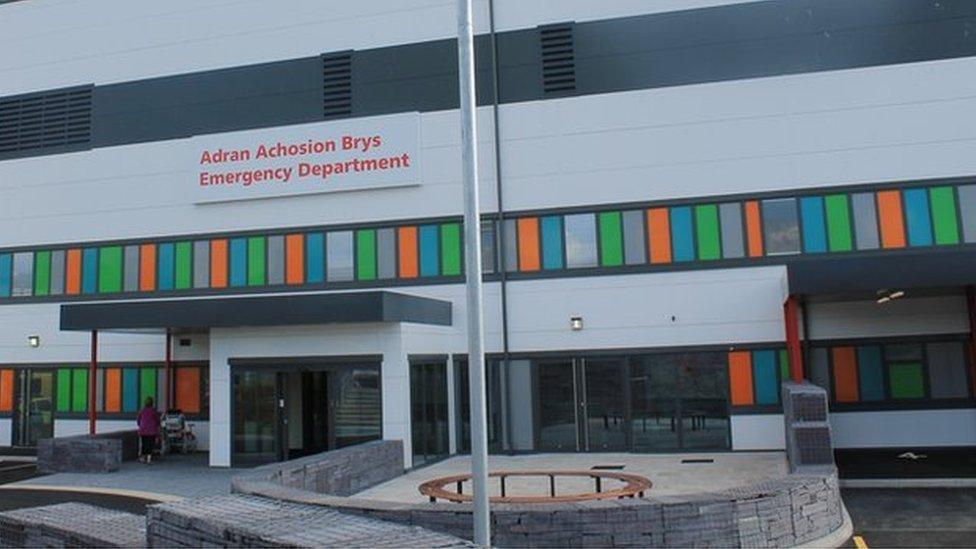Betsi Cadwaladr health board avoids being put in special measures
- Published
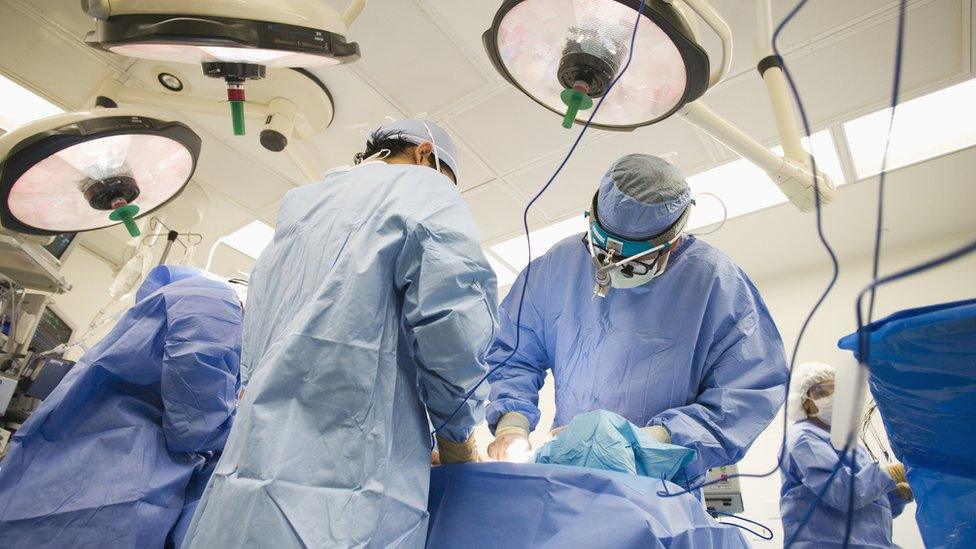
Targeted intervention is the second highest level of oversight by the Welsh government
Betsi Cadwaladr health board will not be put back into special measures despite a series of recent failings.
But Health Minister Eluned Morgan announced Ysbyty Glan Clwyd, in particular its vascular services and emergency care, had been put into "targeted intervention".
This is the second highest level of oversight by the Welsh government.
The health board said providing high quality care and keeping patients safe remained its priority.
It follows criticism of these services at Ysbyty Glan Clwyd in recent reviews, with Ms Morgan calling them "unacceptable".
In February, she warned "there would be consequences" if she was not convinced the health board was making the necessary improvements or "heading in the right direction" within three months.
The announcement means the health board is now in targeted intervention - one step below special measures - in several areas.
Ms Morgan said she had asked the health board to ensure a new director of safety and improvement post was created.

What are special measures?
There are four levels of Welsh government oversight for health boards in Wales.
These are, in escalating order: routine arrangements, enhanced monitoring, targeted intervention and special measures.
An entire health board can be in special measures, as Betsi Cadwaladr was between 2015 and November 2020, or just specific departments.
Targeted intervention is a heightened level of escalation that requires significant action on the part of the health board and is accompanied by continued Welsh government oversight.

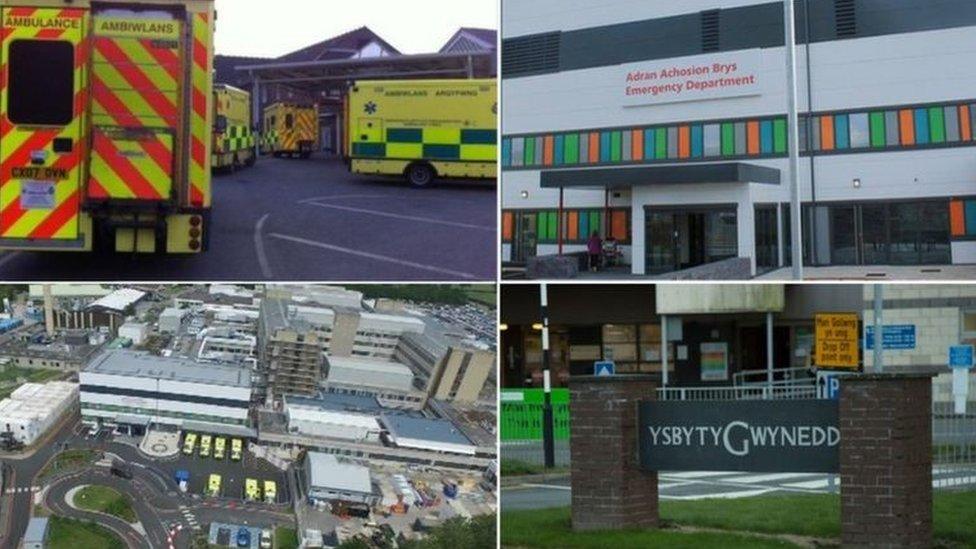
Betsi Cadwaladr's responsibilities include three general hospitals
Ms Morgan made the announcement about the troubled north Wales health board in the Senedd.
It was in special measures, under direct Welsh government control, from the summer of 2015 until November 2020.
It came after a string of financial woes, management failings and growing waiting lists, with the last straw a damning report into the Tawel Fan mental health unit.
After 1,996 days, Betsi Cadwaladr was judged to have made enough improvements and was brought out of special measures.
But after recent damning reports, opposition parties said it had been the wrong decision and "premature" to bring it out of special measures.
Ms Morgan said she had not wanted to put the health board back into special measures as she wanted to make improvements with it, rather than by doing things to it.

'It's dangerous'
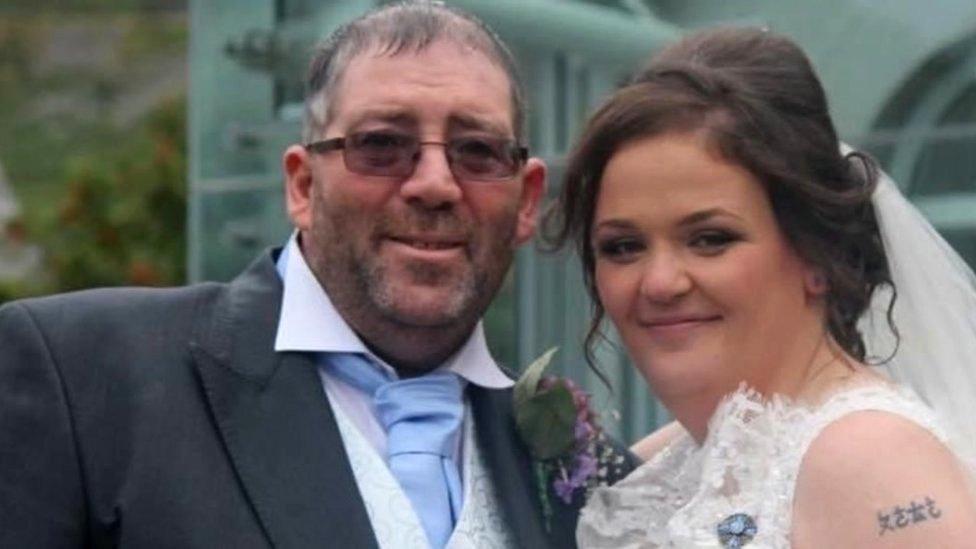
Dad-of-five Pete Calley was 51 when he died on 13 April
The wife of a man who died of a heart attack in April has branded Ysbyty Glan Clwyd "dangerous".
The father of Esyllt Calley's five children, Pete Calley, was 51 when he died on 13 April. Their youngest is 16 weeks old.
Ms Calley said he had a heart attack because of vascular problems and failures in his treatment.
The 35-year-old said those happened after the health board's decision to restructure vascular services and centralise them at Ysbyty Glan Clwyd.
That service was named as a particular area of concern by Ms Morgan on Tuesday.
Ms Calley, from Llanllyfni, Gwynedd, said the response from Ms Morgan was not good enough.
She accused her of not being aware of how serious the situation was.
"It's not just the vascular unit at Ysbyty Glan Clwyd that's been affected," she said.
"It's the accident and emergency department, the mental health units. It's all falling apart."
More needed to be done to "stop the spread of the disaster", she said.
"The place is dangerous," Ms Calley said. "It needs to be closed down and someone needs to be held responsible for all the failings.
"The health board itself and individuals need to be held accountable for what they've done."

'Special measures in all but name'
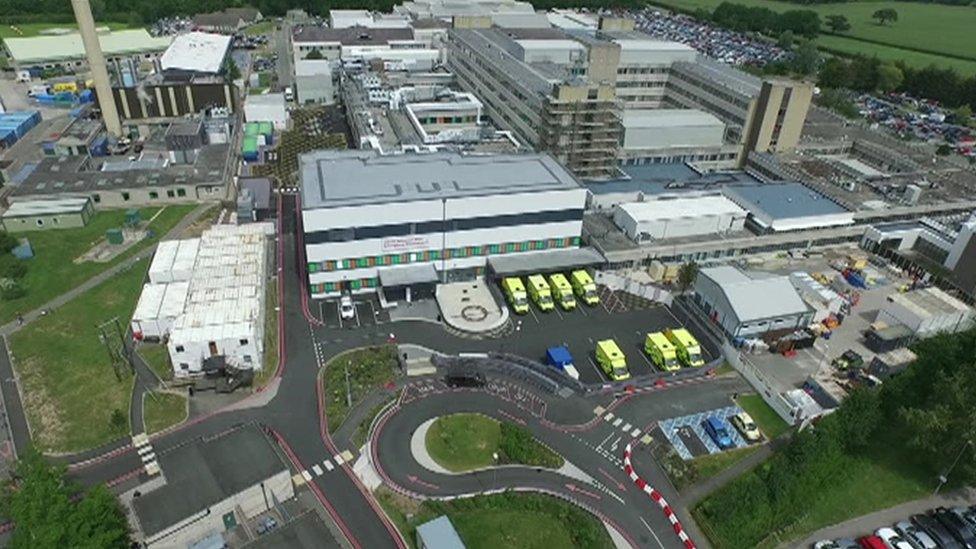
The health board's watchdog said the move was "special measures in all but name".
North Wales Community Health Council's chief officer, Geoff Ryall-Harvey, said he believed the plan was robust but needed to be applied with more consistency and diligence than was seen with special measures.
He said: "It is certainly, in my opinion, more than we saw happening during the five years of special measures.
"I particularly like the involvement of an external organization, Improvement Cymru, to carefully monitor progress, and of course the CHC will be doing that as well."
He said he was worried Betsi Cadwaladr was in a "downward spiral" in terms of the recruitment of skilled staff for Ysbyty Glan Clwyd.
"It really is vital that Betsi Cadwaladr receive the support that's outlined in the plan," he added.
How has the health board performed?
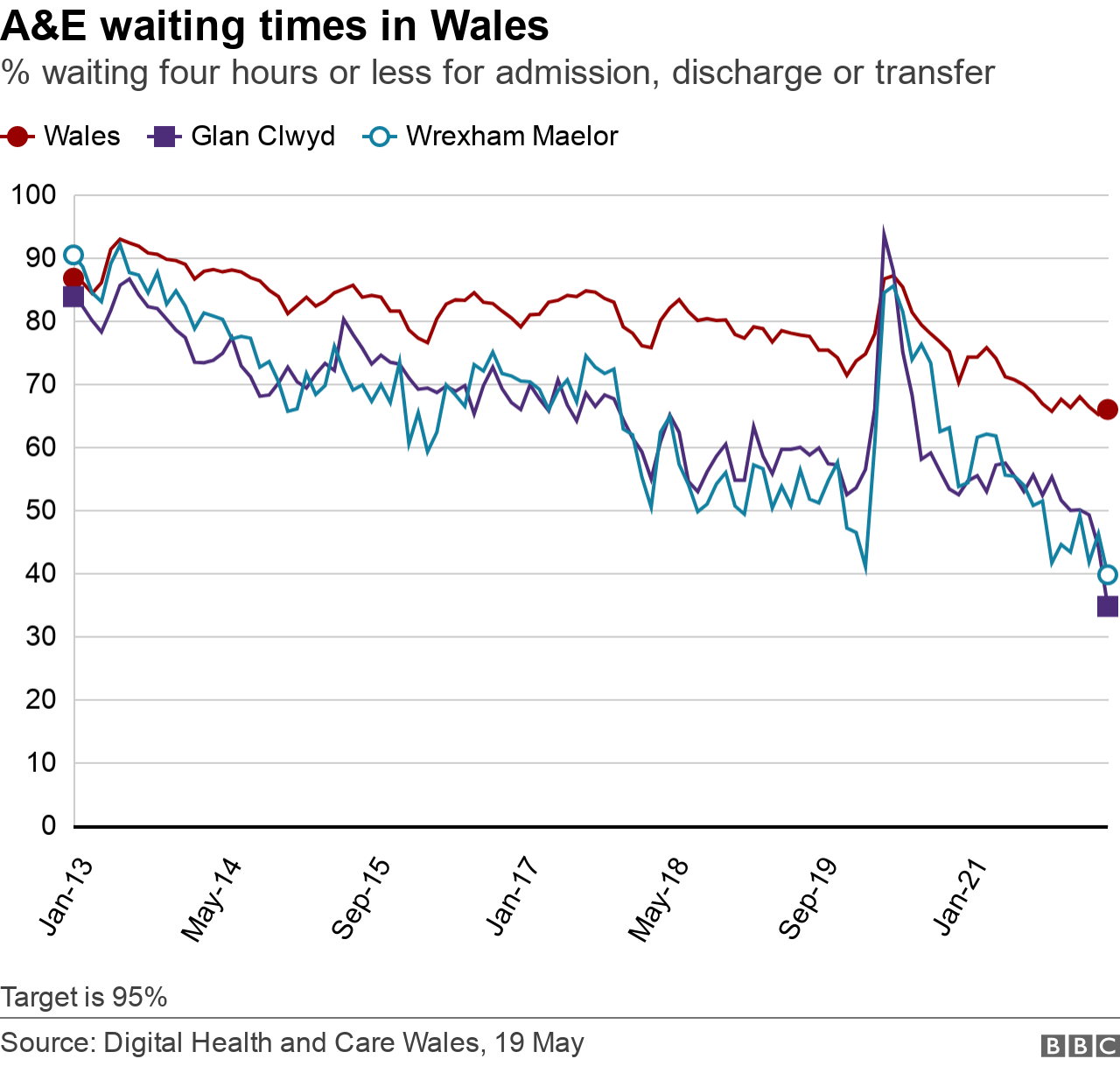
In August 2018, Wrexham Maelor hospital had the worst A&E times, then a record low of 49.7% of patients seen within four hours.
It was even lower in January 2019, just before the pandemic, and it has worsened since last autumn.
In the latest figures for April 2022, there were 39.7% of patients waiting four hours or less.
At Ysbyty Glan Clwyd it was even lower at 34.7%. That was the second-worst of any hospital in Wales.
In October 2021, the Grange Hospital in Cwmbran, Torfaen, was as low as 33.9% but has since recovered.
Betsi Cadwaladr health board's ambulance response times are below the Welsh average with 46.2% of red calls being responded to within eight minutes.
What has the political reaction been?
Welsh Conservative Senedd member for Clwyd West, Darren Millar, said he had "zero confidence" the targeted intervention would make any difference.
He questioned why other parts of the health board, such as Wrexham Maelor's emergency department, were not included in the intervention, and also the value of appointing a director of safety and improvement.
"Why can't the extremely highly paid executive team already in place at the health board deliver the improvements that they are employed to do?" he said.
"That is their job and if they're not up to it, they can ship out."
Plaid Cymru health spokesman Rhun ap Iorwerth accused the Welsh government of not understanding the "gravity of the situation".
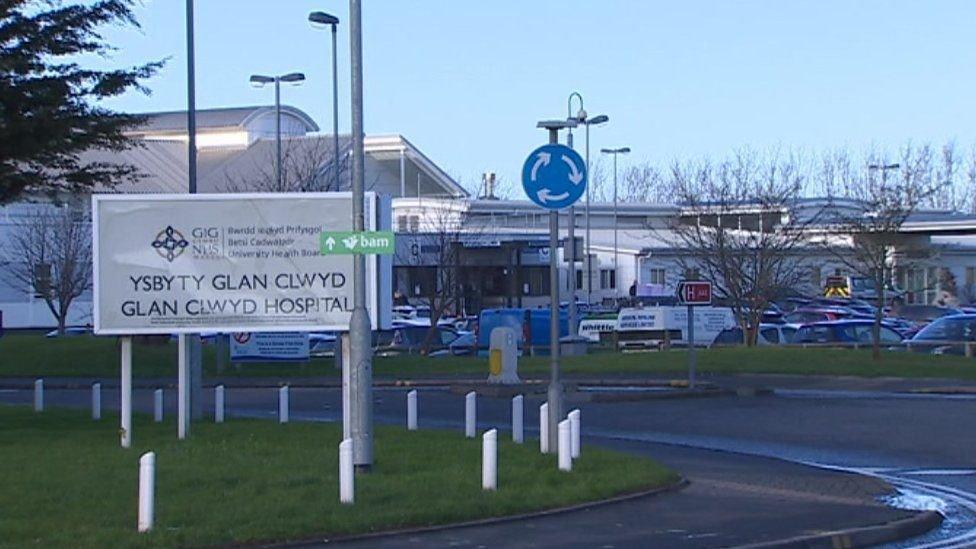
Ysbyty Glan Clwyd is the target of the Welsh government's "targeted intervention"
"Why end here?," he asked, referring to the targeted intervention.
He said there were "so many problems" and asked why Ysbyty Gwynedd was not included.
What has the health board said?
The health board declined an interview with the BBC, but in a joint statement chairman Mark Polin and chief executive Jo Whitehead said: "We are determined to make sustained, steady progress in order to improve their experience and outcomes, wherever in north Wales they live.
"We are a large, complex organisation and our teams have been working hard to make the necessary improvements.
"We know that we have more to do and are absolutely determined to speed up the pace of change and deliver high quality services."
The health improvement body Improvement Cymru will work with the health board, bringing in external expertise to improve Ysbyty Glan Clwyd.
The hospital's medical director, Balasundaram Ramesh, said they were "committed to providing our teams with the right skills, tools and support to practice continuous improvement in their daily work".

WILD MOUNTAINS OF SNOWDONIA: Five farming families open their gates and share their lives
BROTHERS IN DANCE: The remarkable duo at the forefront of UK dance

Related topics
- Published24 November 2020
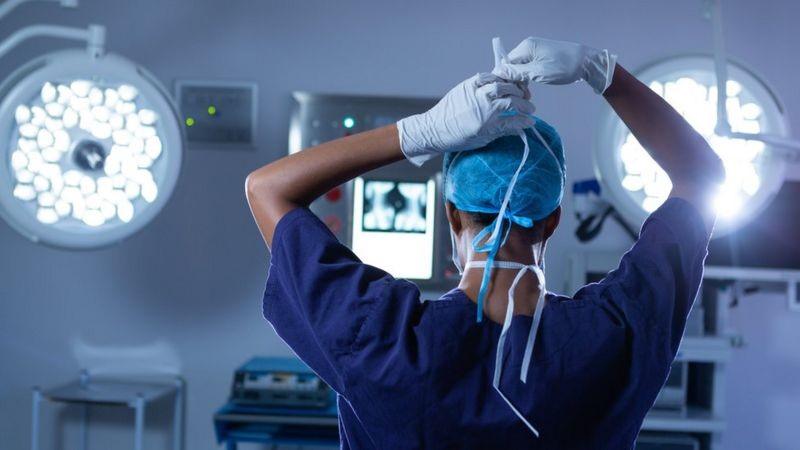
- Published22 May 2022
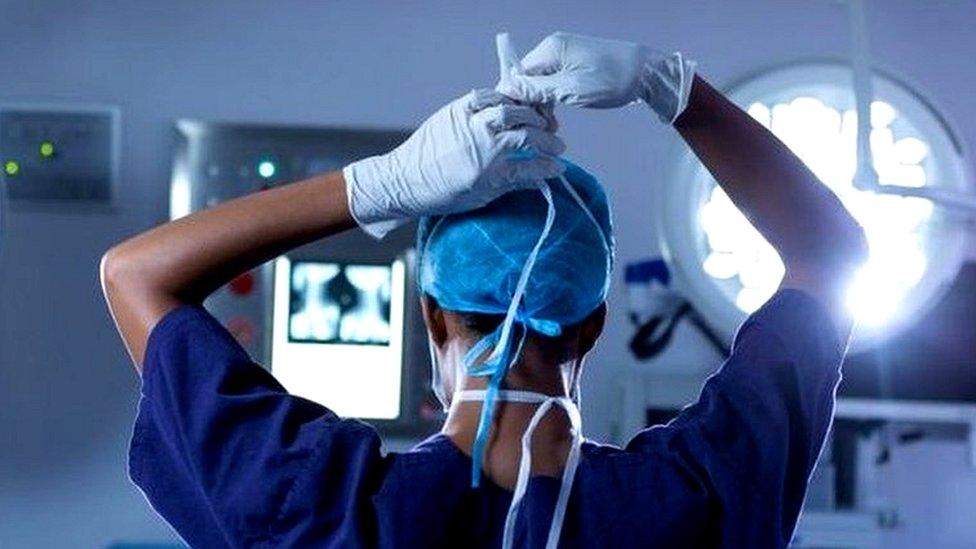
- Published18 May 2022
